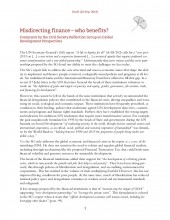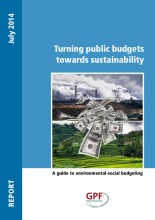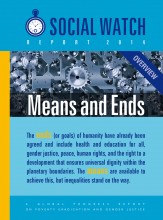The German NGO Forum on Environment and Development, in cooperation with various other German civil society actors, has published a position paper outlining eight key aspects that need to be further built on by the post-2015 Global Development and Sustainability Agenda. Key elements include: a decent life for all; human rights; gender; generational and distributive justice and respect of planetary boundaries; the complete eradication of extreme poverty and hunger; and the safeguarding of natural resources and ecosystems – elements for [...]
Sustainable Development & Human Rights
Comments by the Civil Society Reflection Group on Global Development Perspectives
In a new comment the the Civil Society Reflection Group on Global Development Perspectives states that the SG’s report fails to address the core structural and macro-economic issues that shape the ability to implement and finance people-centered, ecologically sound policies and programs at all levels.
The General Assembly agreed on September 10, 2014 that the proposal of the Open Working Group on the Sustainable Development Goals (SDGs) would be the main basis for a concise set of sustainable development goals that will encapsulate a truly transformative post-2015 development agenda. Other inputs, such as the intergovernmental negotiating process at the UNGA's 69th session will also be considered. Japan, the EU and Australia are also encouraging the inclusion of the report of the Intergovernmental Committee of Experts [...]
The search for accountability in development agendas
„Accountability is only meaningful if the powerful can be brought into account” says Roberto Bissio of the civil society network Social Watch in a recent article. In order to achieve sustainable development, global accountability mechanisms have to change radically. Under the status quo, “mutual accountability” is practiced as oversight of donors and creditors over developing countries. Genuine accountability, however, would also include the developed nations’ commitments to human rights and environmental treaties and their pledges to give 0.7% of their [...]
Public-Private-Partnerships have become a mainstream development model in recent years. On the one hand, after the financial crisis contributions from the private sector are envisaged to fill the gap of decreasing official development assistance from states. On the other hand, an increasing share of development finance is channeled to businesses and financial institutions. NGOs criticize that private sector development priorities are not aligned with national development strategies and emphasize the conflict of interests between making profits and reducing poverty and [...]
After thirteen sessions, the Open Working Group (OWG) on Sustainable Development Goals (SDGs) made an important step forward towards a global sustainable development agenda last week in New York. It formulized a 24-page "outcome document" that includes 17 Sustainable Development Goals, broken down into 169 targets. Once again, conflicts about the means of implementation (MOI) of the SDGs arose between member states in the final hours of the negotiations. The tense climate in the discussions revealed skepticism and suspicion on [...]
On Saturday 19th of July the Open Working Group on Sustainable Development Goals concluded negotiations and submitted a new set of Sustainable Development Goals (SDGs) to the United Nations General Assembly. Though the SDGs will be ultimately negotiated in September 2015, the proposal by the Open Working Group will have a big influence on the final set of goals. The SDGs will supersede the Millennium Development Goals and encompass a broad spectrum of sustainable development: economic, social and environmental. Yesterday [...]
Development aid is being redefined. Before the new UN Development Goals (Post-2015 Agenda) can be determined, the industrialized countries of the OECD wish to redefine which financial flows count as development aid. In a new article, Swiss coalition Alliance Sud analyzes propsoals for a new ODA (Official Development Assistance) standard, which would be used to determine whether donor countries are fulfilling their pledges to allocate .7% of their GNI to development assistance. So far, NGO criticism of the new measurement [...]
A guide to environmental-social budgeting
International development policy is at a crossroads. By September 2015, governments plan to adopt a Post-2015 Development Agenda – an agenda that is supposed to shape the fundamental priorities, goals and strategies for development policy beyond 2015. In parallel, governments have agreed to develop a set of Sustainable Development Goals integrating all dimensions (social, economic and environmental) of sustainable development and being applicable to all countries in the world. Forming one coherent Post-2015 Agenda, including the SDGs, affects all policy [...]
"Means and Ends"
Prologue
Monitoring is only meaningful if the powerful are held to account
Some 4,000 years ago, King Hammurabi had the laws of his domain between the Tigris and Euphrates carved in stone and placed in front of his palace. The laws were written in the plain language of the people, not in the arcane idiom of the priests, so that everybody could understand them. They were not engraved on clay, so they could not be changed at will, and they [...]
Pagination
- Previous page
- Page 42
- Next page




